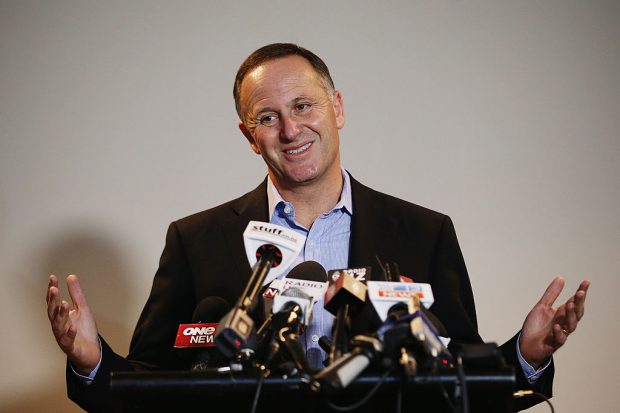 There’s a photo taken in South Africa after Nelson Mandela’s funeral. Three Anglosphere PMs, Tony Abbott, Canada’s Stephen Harper and New Zealand’s John Key, were snapped in a restaurant, enjoying each other’s company and sharing their thoughts.
There’s a photo taken in South Africa after Nelson Mandela’s funeral. Three Anglosphere PMs, Tony Abbott, Canada’s Stephen Harper and New Zealand’s John Key, were snapped in a restaurant, enjoying each other’s company and sharing their thoughts.
Then there were three. After yesterday, now there are none. Within weeks of each other last year, Abbott fell to a party room coup, and Harper was dispatched by Canadian voters after a disastrous election campaign.
Only Key was left standing, and he stood unassailable. No opposition could touch him. No scandal could mire him.
Only Key could pull the plug on Key, and yesterday he did just that. He said he’d seen other leaders staying on too long – he specifically cited John Howard – and he determined to go on his own steam, and not mislead the public about his intentions about staying for another full term.
As Key told ZB radio in New Zealand, he wanted to ensure a ‘transition to a new prime minister, without the baggage’. And as much as he’s loved his job, and revelled in it, that is exactly what he’s doing.
That he is likely to hand over to his preferred successor, Finance minister Bill English, means New Zealand will remain in good hands. Unlike his Australian counterpart Scott Morrison, English is a proven economic manager willing to take tough decisions for the greater good: while he faltered as opposition leader 15 years ago he has grown in office as a minister, Key’s deputy and respected figure in the international economic community. He is no Harold Holt to Key’s Menzies.
Since 2008, Key and English have made New Zealand the economic and political envy of the world. They’ve won three elections on the trot, and dominated parliament despite being in permanent minority government, thanks to New Zealand’s Mixed Member Proportional electoral system. They’ve successfully introduced and implemented world-leading economic, welfare and social reforms inspiring imitators in Britain, Europe, and even Australia. Above all, while Australia languishes under budget deficits as far as the eye can see, this year New Zealand reaped the dividends of the Key years’ taxation and spending reforms and got its budget back into the black, notwithstanding the challenges of the global economy and funding massive reconstruction after the Christchurch earthquakes.
Indeed, thanks to his and English’s prudent work on economic management and reform, Key could commit the billions needed to finance the Christchurch rebuilding effort without damaging the wider Kiwi economy, and when international financial aid was offered could say, “thanks bro, but we’ve got this”. That in his eight years as New Zealand PM we’ve had Kevin Rudd, Julia Gillard, Tony Abbott and Malcolm Turnbull says it all.
Behind the scenes, too, Key has been ably assisted by a chief-of-staff who also came from business, Wayne Eagleson, who understands the importance of building coalitions and maintaining less adversarial relationships with the Opposition, minor parties and giant egos like New Zealand First’s Winston Peters. An avoider of limelight, Eagleson is the antithesis of Peta Credlin, being less a command and control gatekeeper and more a facilitator and supporter for ministers, staff and MPs. Key’s PMO on the top floor of Wellington’s Beehive building, with its magnificent views, is a happy and accessible one, reflecting Key and Eagleson’s ‘we’re here to help you, not tell you’ approach. It is held in high esteem across the New Zealand political spectrum, a far cry from its Rudd, Abbott or Turnbull equivalents.
It’s very rarely we see a PM depart under his or her own steam: in Australia it hasn’t happened since Sir Robert Menzies retired in 1966. Key’s success, and his rare combination of political savvy, policy nous and common touch show that you can be a multi-millionaire merchant banker and still be a successful PM.
Fellow business whiz turned prime minister Malcolm Turnbull can learn from Key and his spectacular success as a politician and popular national leader. If he truly wants insight into the secret of how Key did it, Turnbull should listen to yesterday’s full ZB interview in which Key, good-humouredly, is frank about himself, his family and his motivations for going. Key showcases all the elements of a politician comfortable in his own skin, a leader has always known where he’s going and why, and a PM who relates to his voters as one of them, not as the Chosen One.
If only John Key was leading the Liberal Party on this side of the Dutch. He’s a class act, and will be greatly missed.
Got something to add? Join the discussion and comment below.
Get 10 issues for just $10
Subscribe to The Spectator Australia today for the next 10 magazine issues, plus full online access, for just $10.

























Comments
Don't miss out
Join the conversation with other Spectator Australia readers. Subscribe to leave a comment.
SUBSCRIBEAlready a subscriber? Log in